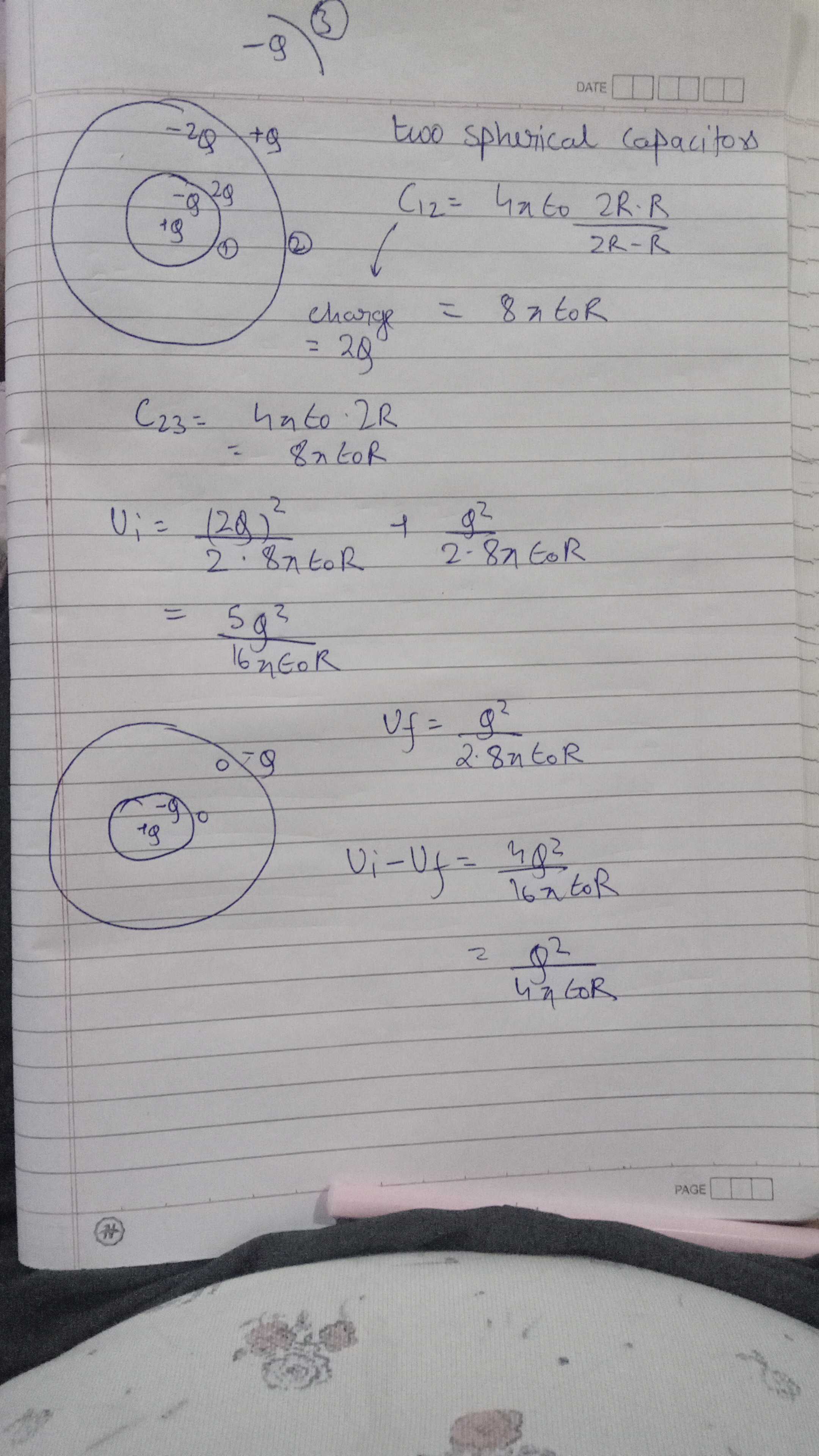44 Replies
@Gyro Gearloose
Note for OP
+solved @user1 @user2... to close the thread when your doubt is solved. Mention the users who helped you solve the doubt. This will be added to their stats.

where am i going wrong
What I would suggest is that after the switch is closed u should assume charge q1 on inner surface and q2 on outer and total charge is always conserved so Q(total final)= Q(total initial) and one equation we can get by equating their potential
U would get the final charges then u can calculate the final energy and initial energy to solve the ques
charges mere theek hai
ig energy mein problem hai
@integralofe^2v
whas the ans?
B
exam mei galti se aagya lol
okay i did this using capactiors logic, like firstly there will be induced charges like how i drawed in red right? and as u seemed in ur diagram, so it will form 2 spherical capacitors and ive drawn electric filed lines in blue so u can see where the energy is stored, first spherical capacitor has radius of R and charge is Q and -Q so use energy stored in capaciotor formula Q^2/2C where capacitance is given by 4pi * epsilon* Radius so ur initial energy is this

did u understand my concept ?
charge distribuation is this

so theres one capacitor with charge 2Q and capacitance 4piepsilon (2R)(R)/2R-R
regardless
i get your idea
working out calcs
that gives A
i dont have official ans key as of now but now it seems to be A only
since 2 method se A aaya
i think the problem in this is prolly that you can't consider interaction pe between the shells once they are connected
the rest is fine

nah that seems wrong
so it yields kq^2/4r as the final pe
and then ui-uf = h
3kq^2/4r - kq^2/4r
which is opt b
but im not sure
hold on let me have a closer look then
minus of that
no like if we take interaction pe bwtween the shells to be 0
which is like the last term of ur exp right
cuz finally theyre connected
idk tho
whats the logic behind it
cuz they're connected finally,, idk taking interaction pe then just doesnt feel right. but this is intuition ofc, maybe someone could confirm
it's like they've become a system now
together
so no interaction pe for them.. self energy term will be there
but it's always better to get it confirmed
@integralofe^2v what do you think? like should we write the interaction pe term once the shells are joined
if they are joined they will still induce equal and opposite charges like a capacitor tho right? idont really understand what u mean by interaction like can u show mathematically ?
i can only think of 1 reason that is, when writing charge we write the entireity of charge that is on sphere, not just on outer sphere as if u ignore the point charge once, the entire sphere is being used as a capacitor yeah? but im not too sure abt this logic need to ask my teacher

nvm this is incorrect ugh wait
why the hell am i using formula of capacitor for point charge
yeah they will induce charges... by interaction i mean the interaction potential energy term that we include for writing the total energy
yea ur right when they are connected there will be no field between outer 2 shells so no interaction PE
agar field nahi hui toh capacitor nhi bol paoge thn...
its probably not B btw
yea im getting A but very weird method like id find any flaw with it but idk

btw the earlier capacitnace formula i used was wrong, thats only when other shell is at infinity, this formula shud be right
doesnt this work ...?
how did u get this term?

there are two capacitors right
one plate of which is at infinity
usi ki capacitance hi
oh okay will give same ans
it's not B? when you don't consider interaction pe, the ans matches right??
this gives A(considered interaction PE)
i have discussion of this on thursday so tab hi update kar paunga
with the right answer
oh okay
yeah exactly... i dont think considering interaction pe is right
@integralofe^2v @nori yep its A
oh okay... then you do consider interaction pe in such cases? im still kinda confused, arent they at the same potential?
could you pls explain
yes we do consider
tbh i dont understand why we wont consider
hmm okay...
we good?
+solved @integralofe^2v
Post locked and archived successfully!
Archived by
<@741159941934415883> (741159941934415883)
Time
<t:1754243403:R>
Solved by
<@813025027611688970> (813025027611688970)
